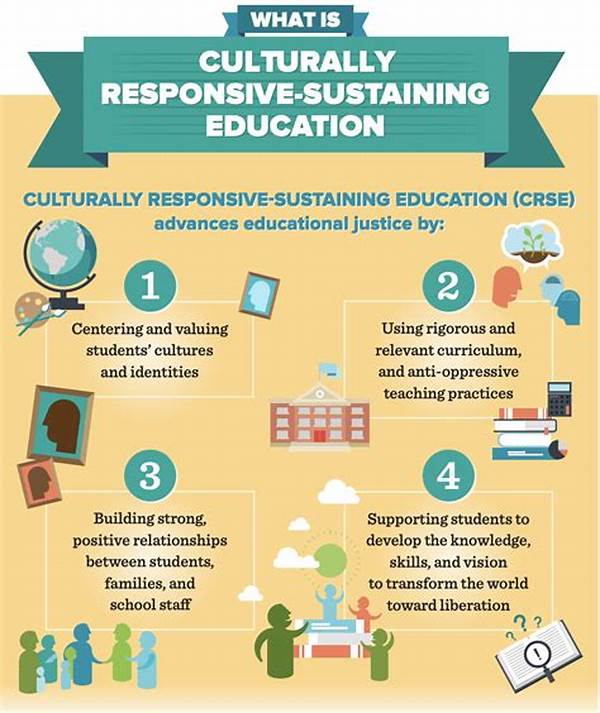In the contemporary educational milieu, the adaptation of curricula to meet the diverse needs of students is imperative. The concept of curriculum responsiveness to student needs encompasses a strategic approach to tailoring educational content and methodologies to align with the varying preferences, skills, and learning styles of students. It represents a paradigm shift from a one-size-fits-all model to a more personalized and inclusive educational experience. This article seeks to explore various facets of this approach and its implications for the educational ecosystem.
Read Now : Advanced Design Learning Strategies
Understanding Curriculum Responsiveness
Curriculum responsiveness to student needs involves an integrative framework whereby educational stakeholders collaboratively design and implement curricula that reflect and accommodate the heterogeneous learning requirements of students. At its core, this involves a thorough assessment of students’ needs, considering aspects such as cognitive abilities, interests, cultural backgrounds, and future aspirations. Educators are tasked with creating a dynamic and flexible curriculum that can be adjusted in response to continuous feedback and assessment. This adaptability is crucial for maintaining relevance and ensuring that educational outcomes align with both individual and societal goals.
Furthermore, curriculum responsiveness to student needs requires leveraging technology and innovative pedagogical strategies. Modern educational tools and digital platforms offer a plethora of opportunities for customization and interactivity, enhancing student engagement and facilitating deeper learning. By incorporating technology, educators can deliver differentiated instruction that caters to varying skill levels and learning paces, ultimately supporting students in reaching their full potential. As such, the successful execution of this responsive curriculum relies heavily on the commitment of educators to continuous professional development and a willingness to embrace change.
Key Elements of Responsive Curriculum Design
1. Needs Assessment: A comprehensive needs assessment is fundamental to understanding the specific requirements of students. This involves collecting and analyzing data on student performance, interests, and feedback to inform curriculum design.
2. Flexibility and Adaptability: A responsive curriculum must be flexible enough to accommodate modifications based on emerging needs and educational trends. This ensures that the curriculum remains relevant and effective over time.
3. Integration of Technology: Utilizing technological tools can enhance the personalization of learning experiences, making education more accessible and engaging for students with varying needs.
4. Cultural Relevance: Incorporating culturally relevant content and perspectives in the curriculum helps in maintaining student engagement and fostering an inclusive learning environment.
5. Collaborative Approach: Effective curriculum responsiveness necessitates collaboration among educators, students, parents, and other stakeholders. This collective effort ensures that diverse viewpoints are considered and integrated into the curriculum development process.
Challenges and Opportunities in Implementation
The endeavor to achieve curriculum responsiveness to student needs is not without its challenges. One significant obstacle is the resistance to change within educational institutions. This resistance can stem from entrenched traditional practices, limited resources, or a lack of awareness about the benefits of a responsive curriculum. Educators may need to navigate complex administrative structures and advocate for the necessary changes to curriculum design and implementation processes. Moreover, ongoing professional development and training are essential to equip educators with the skills and knowledge required to execute a responsive curriculum effectively.
Read Now : Gamified E-learning For Leaders
Nonetheless, the potential opportunities presented by curriculum responsiveness are substantial. By fostering an educational environment that values personalization and inclusion, schools can improve student engagement, motivation, and achievement. A responsive curriculum can also better prepare students for the demands of the modern workforce by developing critical thinking, problem-solving, and adaptability skills. As education systems continue to evolve, embracing curriculum responsiveness to student needs will be crucial for cultivating lifelong learners equipped to navigate an increasingly complex world.
Strategies for Implementing Curriculum Responsiveness
The strategic implementation of curriculum responsiveness to student needs involves a multi-faceted approach. Initially, educational institutions should prioritize building awareness and understanding among all stakeholders about the value and urgency of this approach. Through workshops, seminars, and ongoing communication, educators and administrators can collectively build a shared vision for responsive curricula.
Moreover, it is essential to establish a robust support system that facilitates collaboration and resource sharing. Institutions can benefit from forming partnerships with community organizations, technology companies, and other educational entities. This network can provide both financial and intellectual resources, aiding in the seamless integration of responsive practices. Continuous evaluation and quality assurance measures are vital to monitor the effectiveness of curriculum responsiveness initiatives and enable data-driven improvements.
The Future of Curriculum Design
As educational paradigms continue to evolve, the future of curriculum design will inevitably be shaped by the principles of responsiveness and adaptability. Emerging educational technologies and pedagogical innovations present an unprecedented opportunity to redefine the traditional structures of learning environments. The focus on curriculum responsiveness to student needs will likely become a cornerstone of educational reform efforts, guiding the development of more equitable and flexible learning pathways for all students. As we look to the future, it is imperative to embrace the potential of responsive curricula to meet the demands of an ever-changing global landscape.
Conclusion
In conclusion, curriculum responsiveness to student needs serves as a pivotal aspect of modern education, addressing the necessity for personalized and inclusive learning experiences. The effective implementation of a responsive curriculum demands collaboration, innovation, and a commitment to ongoing professional development by educational stakeholders. Despite the challenges that may arise during this transformative process, the potential benefits of enhanced student engagement, achievement, and preparation for future success are profound. As the educational landscape continues to evolve, fostering curriculum responsiveness will be essential in equipping students with the skills and knowledge needed to thrive in today’s complex world.
